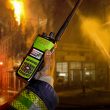GPS aids Missouri Task Force 1 during Joplin search efforts (with related video)
When Joplin (Mo.) first responders needed assistance following a devastating tornado, Fire Chief Mitch Randles called on Missouri Task Force 1, the FEMA Urban Search and Rescue team based in Boone County. The team is qualified and equipped to search for and rescue victims entombed in collapsed reinforced concrete and steel structures. The search team used GPS technology to de-layer structures and help find Joplin residents.
Jefferson City Capt. Matt Schofield is part of Task Force 1. His team brought 14 vehicles to Joplin of different sizes, including tractor-trailers to transport search-and-rescue equipment. They also brought top-notch training and enough resources to be self-sufficient.
"Our training is geared to search and rescue beyond the capability of local fire departments," Schofield said. "Our goal is not to be a drain on the local resources because we already know they are overwhelmed by the incident. So we are self-sufficient and bring everything we need to survive and to support our search-and-research operations."
The team used thermal infrared cameras and seismic listening devices for use on heavy concrete and steel rubble piles to find life, Schofield said.
"By the time a big team like US&R or mutual aid is activated statewide, the local resources have done a lot of that initial work, as far as the volume of patients with immediate assistance," he said. "So we come into to do what we call a secondary search."
A secondary search means the team methodically de-layers the structure and ensures it is completely searched, Schofield said. They also gather information by using mobile tracking logs that automatically transmit location data back to the emergency command center via consumer GPS and mapping software.
"The foundation of that data is the ability to say objectively that this crew has been at this place at this time," he said. "Once that data is collected on a map, we send it to the EOC. They then have the data."
Schofield said the data later is used for training purposes, including an honest assessment of the response, its outcome and any lessons learned.
"If we can have objective GPS data that shows us what's been done then we know where to send those resources in the future," he said.
While the response effort went smoothly, Schofield believes the multijurisdictional response could have worked better if all departments used the same terminology. Codes and slang added some confusion and further showed the need for language standardization that should be adopted nationwide.
"We can do that better in that area," he said.

















